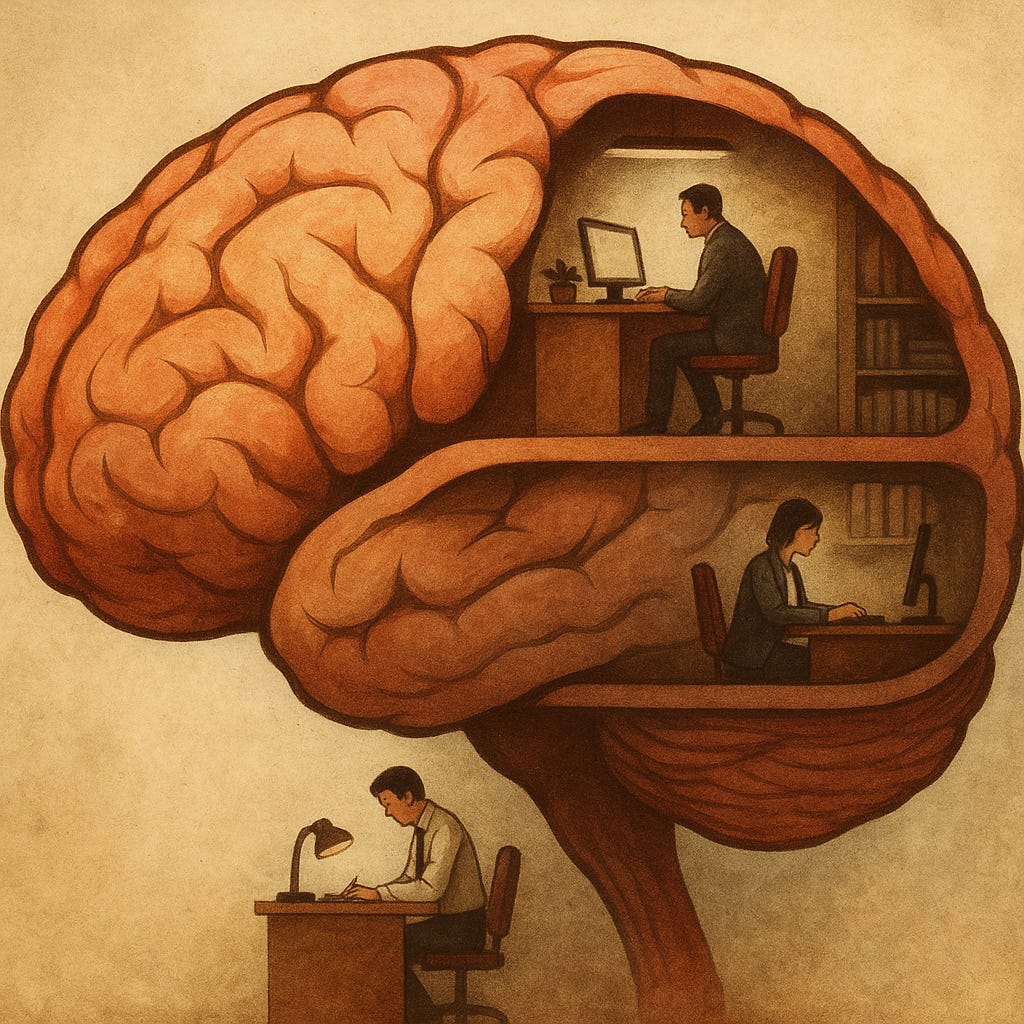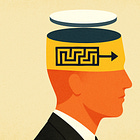How to Think for a Living (Without Burning Out)
Learn how knowledge workers can sustain cognitive capital in a hyper-mental economy—building personal systems, fostering collective responsibility, and thinking for a living without burning out.
Thinking was once considered a luxury. Daydreams, reflection, and idle contemplation were the province of philosophers, artists, and the rare academic. Today, thinking is labour. It is monetised, measured, and stretched across a relentless array of projects, reports, strategy sessions, and AI-assisted outputs.
Cognitive capitalism has transformed the mind into both a tool and a commodity, making the act of thinking itself a primary asset. Yet the very act that defines value has become a source of vulnerability: knowledge workers face unprecedented cognitive demands, mental fatigue, and the risk of burnout.
The irony is palpable. In a world that prizes creativity, insight, and intellectual agility, the mind is at once the greatest advantage and the most fragile resource. Billable hours are no longer simply spent in meetings or executing tasks—they are consumed in sustained, high-level cognition. Every decision, every synthesis of information, every strategic insight draws on finite mental reserves. Unlike physical labour, which can be scheduled, rested, and measured, cognitive labour is continuous, immersive, and often invisible. It thrives on focus but suffers under fragmentation. Slack notifications, email threads, AI suggestions, and overlapping priorities conspire to erode clarity, forcing workers to juggle, multitask, and switch contexts at a pace our brains were not designed to sustain.
Statistics underscore the risk. Burnout rates among knowledge workers are rising, with surveys from Gallup and the World Health Organization highlighting chronic stress, anxiety, and mental health crises. Even top performers—those who excel in creativity, problem-solving, and leadership—report cognitive overload as a primary obstacle to sustainable performance. The very talent that cognitive capitalism demands most is also the talent most vulnerable to depletion. Mental flexibility, once a competitive advantage, is now a fragile asset under siege.
→ This paradox sets the stage for a pressing question: how can individuals survive—and thrive—in an economy that monetises thought without offering mechanisms for rest, reflection, and recovery?
The challenge is not merely about efficiency or productivity hacks; it is about building a sustainable personal operating system, a structure for managing attention, energy, and creative output without sacrificing health or clarity. In cognitive capitalism, thinking for a living is not optional; it is unavoidable. The task is to do it well, deliberately, and sustainably.
The stakes are high, the risks are real, and the need is urgent.
In this issue of Brewed for Work, we explore how to sustain cognition as a primary asset in cognitive capitalism. Thinking for a living offers immense opportunity but carries significant risks: mental fatigue, burnout, and scattered focus. We will examine strategies to build a personal operating system that protects mental capital, manages attention deliberately, and enables knowledge workers to thrive without sacrificing clarity, health, or long-term cognitive resilience.
More posts from this series:
Today’s Issue at a Glance:
Cognition as Labour: The New Capital
The Fragility of Mental Assets
The Productivity Mirage
Towards a Personal Operating System
Collective Responsibility: Rethinking Work Culture
So grab your favourite mug, and let's get brewing!
Welcome to Brewed for Work, 🔒subscribers-only🔒 offering by The Percolator dedicated to professional growth and upskilling. Each week we share essays, insights and resources to aid you in your work-life.
🚀
Now, you can Upgrade your Subscription for Free when you Invite your Friends to Subscribe to The Percolator
Knowledge work has become the defining labour of the 21st century. Unlike industrial or service-based work, it relies not on physical effort but on cognitive capacity: the ability to analyse, synthesise, strategize, and create.
In cognitive capitalism, mental agility is the most valuable currency. Companies compete not only on products or services but on the quality of the thinking that produces them. Strategic insights, innovation, and problem-solving are monetised in real time, making the mind both a tool of production and an asset on the balance sheet. Yet unlike machines, the human brain has limits. Cognitive capital is finite, fragile, and vulnerable to depletion, making the management of mental energy a central challenge for those who “think for a living.”
→ The stakes are visible in the growing incidence of burnout, anxiety, and mental fatigue among knowledge workers.
The World Health Organization now recognises burnout as an occupational syndrome, and surveys from Gallup indicate that a significant portion of highly skilled professionals experience chronic stress related to cognitive overload. Unlike physical fatigue, mental depletion is invisible, accumulative, and often socially reinforced. The expectation that knowledge workers should be endlessly creative, agile, and available compounds the pressure. The very skill that generates value—deep, sustained cognition—is also what leaves individuals most exposed.
This tension reflects a structural feature of cognitive capitalism. Work has become more layered, fragmented, and digitally mediated, demanding not only high-level thinking but continuous context switching. Knowledge workers are expected to plan strategically, execute tasks efficiently, and integrate insights across multiple domains simultaneously. AI tools, collaboration platforms, and global workflows amplify both opportunity and complexity, enabling faster output but also multiplying cognitive demands. Attention is scarce, focus is under siege, and mental bandwidth is constantly rationed.
The challenge, then, is not merely a question of productivity or efficiency; it is a question of sustainability. How can individuals protect their mental capital while operating in an economy that relies on it? How can thinking itself become a sustainable practice rather than a source of exhaustion? The answer lies in developing a personal operating system: a framework of routines, boundaries, and strategies that governs attention, energy, and creative output. This is not a set of hacks or a productivity gimmick; it is the architecture that allows the mind to thrive in conditions of sustained cognitive demand.
🏅
Keep reading with a 7-day free trial
Subscribe to The Percolator to keep reading this post and get 7 days of free access to the full post archives.






